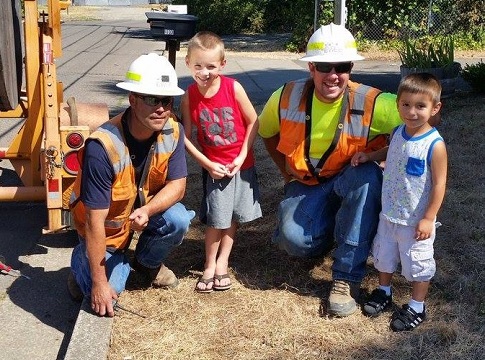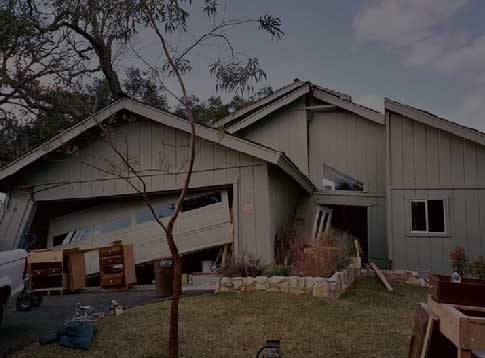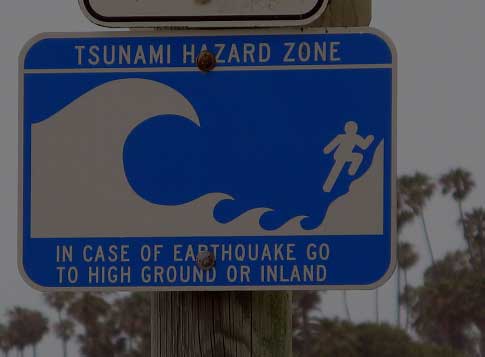Related News
Related News
-
EWEB opens application for 2024 Electric Mobility Community Grants
Grant awards of up to $30,000 to cover costs associated with electric mobility projects.
Find Out More -
Upgrades to Eugene's downtown electric network continue
You may have noticed construction this week on the corner of 7th and Pearl Street. That’s because crews replaced a corroded, aging vault with an innovative, new Voltek vault. The Voltek design allows for the new infrastructure to be built inside of the existing aging vault. We’re able to install the new vault while the cables are still energized, minimizing disruption to customers and traffic while cutting construction time in half.
Find Out More -
The Big Freeze 2024: After Action Report
Winter 2024 was one for the records books, and we'll look back on it for years to come and say, "That was a doozy!" The back-to-back January Ice Storms caused widespread damage to EWEB’s service territory, affecting approximately 38,000 customers. Preliminary repair costs were over $8 million, and additional repairs to transmission lines are still required.
Find Out More -
Fixing the Unseen: Water Pipeline Replacement in Unincorporated Eugene
Learn more about EWEB's methods for monitoring and replacing aged water pipelines.
Find Out More -
EWEB General Manager Delivers 2024 State of the Utility
General Manager Frank Lawson delivered his address at the March 5 public Board of Commissioners meeting
Find Out More -
Nine days without power: My ice storm story as an EWEB customer and employee
While beautiful and peaceful, buying a home on the edge of the forest and surrounded by trees has its tradeoffs. Moving “upriver,” I knew there would be more threats to prepare for, including Mother Nature’s seasonal surprises.
Find Out More -
Preparation and Resilience: How EWEB Maintained Water Service During Recent Ice Storm
Learn about the projects and people that helped EWEB keep water flowing throughout the extreme weather event.
Find Out More -
EWEB achieves power restoration milestone over the weekend
Crews have so far restored power for 92% of customers who originally lost power at the height of the ice storm.
Find Out More -
Reenergized McKenzie River Valley transmission lines allow EWEB crews to restore power upriver
On Friday, a majority of EWEB crews tackled power restoration efforts upriver, after federally managed transmission lines were reenergized Thursday.
Find Out More -
EWEB estimates one week to complete power system restoration
On Wednesday, EWEB crews restored power for about 10,000 customers by repairing large equipment first.
Find Out More -
Second round of ice and ensuing thaw prompt mass power outages
On Wednesday, all EWEB crews, who have been working nonstop since Saturday, traversed EWEB’s service territory assessing the damage and restoring transmission lines and main power feeders.
Find Out More -
Power restored at EWEB’s water treatment plant
Crews restored electric power at EWEB's Hayden Bridge Water Filtration Plant Monday evening, allowing operators to switch off the generators and rely again on the grid. Meanwhile, EWEB crews brace for additional outages amidst second round of ice and during the coming thaw.
Find Out More -
EWEB crews focusing on restoring electric service for Hayden Bridge Water Filtration Plant
With more ice forecasted for Tuesday, all EWEB crews are in the field assessing outages and restoring power.
Find Out More -
EWEB crews making downed lines safe and restoring power across Eugene and the foothills
As EWEB works to restore electric service to customers affected by the ice storm, the customer-owned utility is following established policies and its “hierarchy of repair” to prioritize repairs that restore electric service to the greatest number of customers.
Find Out More -
Leaburg Decommissioning Action Plan
Plan details next steps through regulatory processes to begin dismantling Leaburg Dam by 2032.
Find Out More - Show More
Spring Cleaning? Let's talk about Spring Emergency Preparedness!
March 19, 2024 • Robyn Smith, EWEB Communications

Spring is officially here and that means the plants are blooming, the sun is (sometimes) shining, and the grass is green! We've had our fair share of severe weather already, but spring weather is notoriously unpredictable. Thunderstorms can appear out of nowhere and lead to severe events such as lightning and flooding. Such emergencies can threaten our immediate safety, as well as food and power supplies.
It also means dry, hot summer days are right around the corner, which brings an increased risk of wildfires. Even in historically wet, mild Oregon, summers are getting hotter and drier, with longer wildfire seasons. The overall risk of wildfires is growing. By working together, we can protect our community and natural resources from destructive fires.
While you're in the midst of spring cleaning and garden care, consider completing a few emergency preparedness tasks to help keep your home and family safe during extreme weather events.

Spring is a great time to review your safety checklist
Smoke Alarms
Almost three out of five home fire deaths are the result of fires in properties with no smoke alarms or smoke alarms that failed to operate. Test your smoke alarms every month and replace the battery at least once a year. If the alarm makes a "chirping" sound, replace the battery immediately. Smoke alarms should be in every bedroom and in the common areas on each floor of a home.
Carbon Monoxide Detectors
Carbon monoxide (CO) is an invisible, odorless gas that can kill. CO alarms should be installed in a central location outside each bedroom and on every level of the home. Just like smoke alarms, CO alarms require that you change the batteries, test them and interconnect them, if possible. Also, make sure vents for your gas appliances (fireplace, dryer, stove and furnace) are free and clear of snow or debris.
Fire Extinguishers
Purchase a multi-purpose fire extinguisher for your home that is large enough to effectively put out a small fire, but not so heavy that is difficult to handle. Your fire extinguishers should be located near exits so that you can easily escape if the fire gets out of control or the room fills with smoke. Learn more about choosing and using fire extinguishers.
Family Emergency Plan
Every family should have an emergency plan in place in the event of a natural disaster or other catastrophic event. Spring is a great time to review that plan with family members.
- To create a plan you can share with others, click here.
Be Careful When Cleaning
Most of us live with dangerous poisons lurking in kitchen cabinets, bathrooms, basements or garages. When warning labels are ignored or chemicals fall into the wrong hands, disaster can occur. Keep the Oregon Poison Control Center number, (800) 222-1222, in your cell phone contacts. The line is open 24 hours a day, 7 days a week.
When the power goes out...
First, if you suspect your home or business is the only outage, check your circuit panel for tripped breakers.
Next, check our online outage map to see if a power outage is reported in your area. If you have a Smart Meter with the communication feature enabled, EWEB will automatically be notified when your power is out. Our outage map has the most recent information on power outages, including updates that show progress during an outage repair.
Finally, if you do not see your outage on the map, call our toll-free outage reporting line at 1-844-484-2300. You must complete all prompts to record your outage. Please do not report your power outage on social media. We do not regularly monitor our social media channels outside of business hours.
Prepare ahead of time
Take an inventory of the items you need that rely on electricity. Plan for batteries and other alternative power sources, such as a portable charger or power bank, to meet your needs when the power goes out. Have flashlights for every household member. Determine whether your home phone will work in a power outage and how long battery backup will last. Use surge protectors to safeguard valuable electronic equipment such as computers and home entertainment systems. Fully charge mobile phones and backup batteries. You should also know how to manually open your garage door or park your car outside before a storm.
Know Your Medical Needs
Customers dependent on power for life-support equipment should have a backup plan for power outages. Talk to your medical provider about a power outage plan for medical devices powered by electricity and refrigerated medicines. Find out how long medication can be stored at higher temperatures and get specific guidance for any medications that are critical for life.
Food Storage
Have enough nonperishable food and water. Keep freezers and refrigerators closed. The refrigerator will keep food cold for about four hours, and a full freezer will keep the temperature for about 48 hours. Use coolers with ice if necessary. Monitor temperatures with a thermometer. Throw away any food that has been exposed to temperatures 40 degrees or higher for two hours or more or that has an unusual odor, color, or texture.
Learn more about power outages...

Creating defensible space around your home & property
Your house and outbuildings are potential fuel in a fire-prone environment. To help your home survive a wildfire, create defensible space between your home and its surroundings by 100 feet or more. Defensible space gives firefighters an opportunity to safely defend your home and other structures from a wildfire while breaking up pathways for fire that can lead to home ignition. Firefighters can’t always protect every individual home, so it’s your responsibility to take action.
Step One: Create Defensible Space
Landscape:
- Landscape with fire-resistant plants
- Reduce flammable vegetation and other fire fuels around the home.
- Remove brush and grass from around buildings.
- Keep grass and weeds mowed to less than 4 inches in height.
- Stack wood piles on bare or gravel areas or in an enclosed shed at least 30 feet from the home.
- Avoid using wood mulches within 5 feet of your home. Use gravel, rock mulches or hard surfaces instead.
Structures:
- Screen the attic, foundation vents, and under decks to prevent entry of burning embers.
- Use fire-resistant roofing, decking and siding.
- Regularly remove leaves and pine needles from gutters.
- During summer, do not store flammable materials near your home.
- Make sure any overhanging limbs are trimmed back at least 10 feet or more from the roof.

Step Two: Maintain it
Defensible space and wildland fuel treatments must be regularly maintained to remain effective. Vegetation grows back! Fresh-cut hardwood trees resprout rapidly after cutting, and shrubs like manzanita, bitterbrush, and poison oak often regrow in cleared areas, along with invasive weeds such as cheatgrass, blackberries, and Scotch broom. All this brush and grass quickly becomes new fuel for a wildfire.
Techniques for fuels maintenance:
- Preventative Management
- Pruning/limbing
- Cutting
- Removal
- Disposal
Tip: Reduce fuels by thinning and spacing vegetation vertically and limbing up trees horizontally to interrupt fire’s path and keep flames small and on the ground.
See a list of power line friendly trees
Watch: Why is defensible space important?

Join the Pledge to Prepare
Pledge to Prepare is a 12-month blueprint to guide your emergency preparedness efforts. By following our monthly newsletter, you'll be two weeks prepared by the end of this year!
Each month, you'll have a chance to enter to win cool and useful emergency preparedness supplies! Click here to sign up for monthly emails.
Related Programs
Here are some of the ways we work proactively to keep the lights on and the tap water flowing.
We offer financing options for customers to purchase a backup power system.
You can significantly reduce damage to your home by fixing a number of known and common weaknesses. This FEMA booklet is a good start to begin strengthening your home against earthquake damage.





